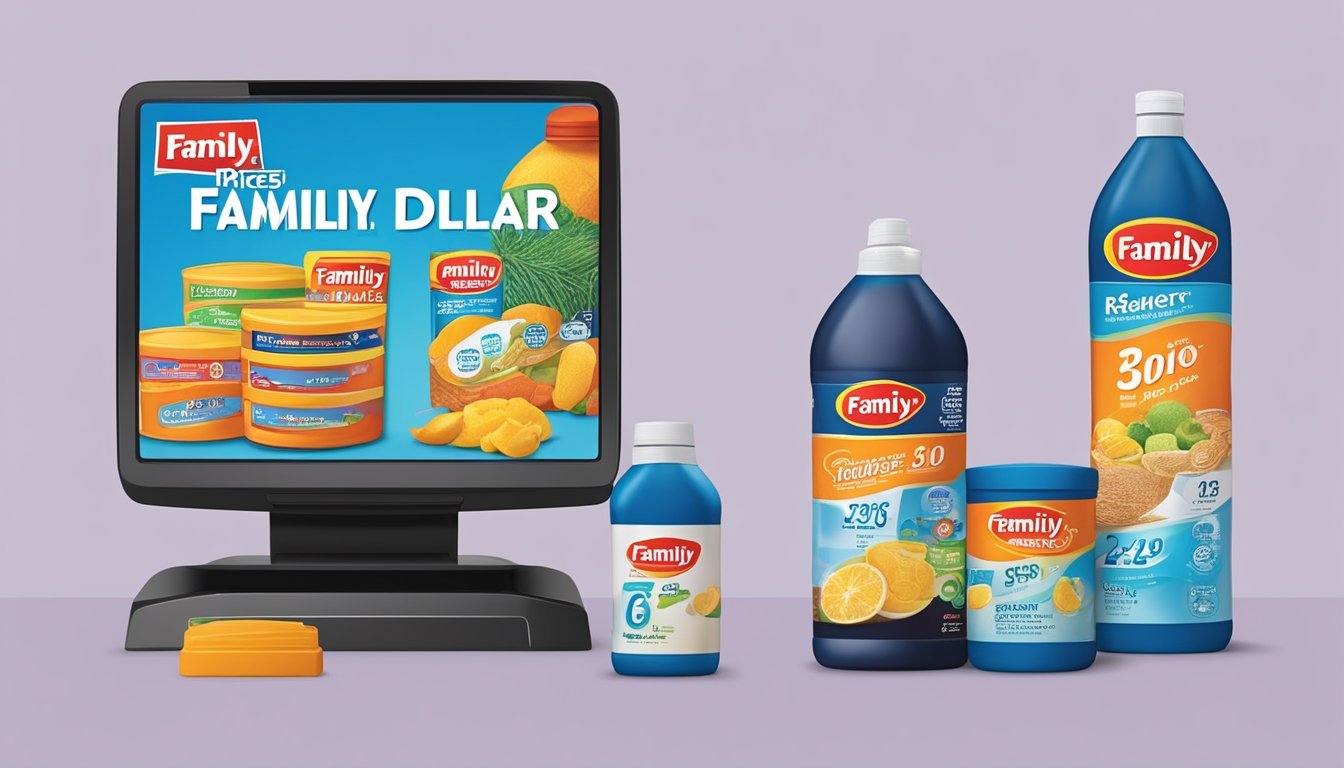Is Family Dollar Cheaper Than Meijer?
A price comparison of budget retailers
Family Dollar and Meijer are popular retail chains that offer a variety of products to budget-conscious shoppers. Many consumers wonder which store provides better value for their money when it comes to everyday essentials and groceries.
While Family Dollar may have lower prices on some items, Meijer generally offers a wider selection and potentially better overall value for most shoppers. Family Dollar focuses on providing basic household goods and packaged foods at discounted prices, often in smaller package sizes. Meijer, on the other hand, is a full-service superstore with a more extensive grocery department, fresh produce, and a broader range of products across multiple categories.
Price comparisons between the two stores can vary depending on specific items and locations. Family Dollar may have cheaper options for certain household goods and non-perishables, but Meijer's larger selection and frequent sales can lead to significant savings on a wider range of products. Shoppers looking to make an informed decision should consider factors beyond just price, such as product quality, variety, and convenience.
Overview of Family Dollar and Meijer
Family Dollar and Meijer are prominent retail chains in the United States, each with distinct business models and market focuses. Both companies have evolved over decades to serve different customer segments and geographic regions.
History and Business Models
Family Dollar was founded in 1959 by Leon Levine in Charlotte, North Carolina. It operates as a discount store chain, offering a variety of merchandise at low prices. The company focuses on providing everyday essentials, household items, and food products to budget-conscious shoppers.
Meijer, established in 1934 by Hendrik Meijer in Greenville, Michigan, began as a grocery store. It pioneered the supercenter concept, combining groceries with general merchandise. Meijer stores are typically larger than Family Dollar locations and offer a wider range of products, including fresh produce, electronics, and clothing.
Store Locations and Presence
Family Dollar has a widespread presence across the United States, with thousands of stores in rural and urban areas. The chain is particularly strong in the southeastern and midwestern regions.
Meijer's operations are concentrated in the Midwest, with a significant presence in Michigan, Ohio, Indiana, Illinois, Kentucky, and Wisconsin. The company has fewer total stores compared to Family Dollar but maintains larger individual locations.
Meijer supercenters are often found in suburban areas and smaller cities, while Family Dollar tends to have a stronger foothold in urban neighborhoods and rural communities. This geographic distribution reflects each retailer's target market and business strategy.
Product Assortment and Availability
Family Dollar and Meijer offer distinct product selections, reflecting their different retail models. Family Dollar focuses on affordable household basics, while Meijer provides a wider range of groceries and general merchandise.
Produce Section
Family Dollar's produce offerings are limited. Most locations stock a small selection of basic fruits and vegetables, often pre-packaged. The quality can vary, and organic options are rare.
Meijer, in contrast, boasts an extensive produce department. Shoppers can find a diverse array of fresh fruits and vegetables, including seasonal and exotic varieties. Organic produce is readily available. Meijer often partners with local farmers to provide regional specialties.
The store layout at Meijer typically places produce near the entrance, emphasizing freshness and quality.
Meat Counter
Family Dollar does not typically feature a full-service meat counter. Their meat offerings are usually limited to pre-packaged, processed meats and frozen options.
Meijer provides a comprehensive meat department. Customers can choose from a wide selection of fresh cuts, including beef, pork, poultry, and seafood. Many Meijer locations offer:
Custom cuts from in-store butchers
Marinated and seasoned meats ready for cooking
Organic and grass-fed options
Local and specialty meats
The variety and quality at Meijer's meat counter generally surpass what's available at Family Dollar.
Dairy Section
Family Dollar stocks basic dairy essentials. Shoppers can find milk, eggs, cheese, and butter. The selection is often limited to popular brands and sizes.
Meijer's dairy section is more expansive. It includes:
Multiple brands of milk, including organic and plant-based alternatives
Various yogurt styles and flavors
Specialty cheeses and gourmet butter
Lactose-free options
Meijer also tends to offer more competitive pricing on dairy staples due to higher volume sales.
Frozen Foods and Dry Goods
Family Dollar's frozen food section focuses on convenience items and budget-friendly options. Shoppers can find:
Frozen pizzas and meals
Basic frozen vegetables
Their dry goods selection includes pantry staples, snacks, and canned goods. The emphasis is on value-priced items and smaller package sizes.
Meijer offers a more comprehensive frozen foods department. It includes:
Premium frozen entrees and appetizers
A wide variety of frozen fruits and vegetables
Specialty diet options (gluten-free, vegan)
Meijer's dry goods selection is extensive, featuring:
Name-brand and store-brand options
Bulk sizes for families and volume shoppers
International and gourmet items
Health food and specialty diet products
The range of choices at Meijer caters to diverse dietary needs and preferences.
Price Comparison and Cost Saving
Family Dollar and Meijer employ different pricing strategies to attract budget-conscious shoppers. Their approaches to everyday low prices, discounts, digital coupons, and loyalty programs can significantly impact customers' grocery bills.
Everyday Low Prices and Discounts
Family Dollar focuses on offering consistently low prices on a limited selection of items. Their inventory primarily consists of household essentials and non-perishable goods. Meijer, in contrast, provides competitive pricing across a broader range of products, including fresh produce and name-brand items.
Meijer's larger stores allow for bulk purchases, potentially leading to lower per-unit costs. Family Dollar's smaller format stores often feature $1 sections, appealing to shoppers seeking extreme bargains.
Both retailers run weekly sales and promotions. Meijer typically offers more extensive discount programs, including buy-one-get-one deals on various product categories.
Digital Coupons and Loyalty Programs
Meijer's mPerks program allows customers to clip digital coupons and earn rewards on purchases. Users can accumulate points for discounts on future shopping trips. The program often includes personalized offers based on shopping history.
Family Dollar's digital coupon program is more basic but still provides savings opportunities. Their Smart Coupons can be loaded to a digital account and applied at checkout.
Meijer's loyalty program tends to offer more substantial savings potential due to its wider product range and higher purchase volumes. Family Dollar's program, while simpler, can still lead to meaningful savings on everyday essentials.
Both retailers' digital platforms allow customers to browse deals and plan shopping trips to maximize savings.
Shopping Experience and Convenience
Family Dollar and Meijer offer distinct shopping experiences tailored to different customer needs. Store layout, product organization, and checkout efficiency play key roles in shaping each retailer's convenience factor.
Store Layout and Navigation
Family Dollar stores are typically smaller, with narrow aisles and densely packed shelves. Products are arranged by category, making it relatively easy to find specific items. The compact size allows for quick shopping trips, ideal for grabbing essentials.
Meijer stores, in contrast, are spacious supercenters. Wide aisles and clear signage facilitate navigation through various departments. The layout accommodates a broader range of products, from groceries to electronics and clothing. This setup creates a one-stop shop experience, convenient for customers seeking diverse items in a single trip.
Checkout Efficiency and Service
Family Dollar often operates with minimal staff, which can lead to longer wait times during busy periods. Self-checkout options are limited or unavailable in many locations. The focus is on keeping costs low rather than providing extensive customer service.
Meijer typically offers more checkout lanes and self-service options. Staff members are usually available to assist customers throughout the store. The retailer emphasizes customer service, with dedicated personnel in specialized departments like pharmacy and electronics. This approach can result in a more efficient and personalized shopping experience.
Comparative Shopping Strategies
Effective shopping strategies can help maximize savings when comparing Family Dollar and Meijer. Smart approaches to purchasing and planning can stretch your budget further at either store.
Bulk Buying and Family Shopping
Buying in bulk often yields better value, especially for families. At Meijer, larger package sizes of household staples like paper products, cleaning supplies, and pantry items frequently offer lower per-unit costs. Family Dollar's smaller store format may limit bulk options, but they still provide multi-packs of popular items.
For families of 4 or larger, Meijer's wider selection can be advantageous. Their expansive grocery departments allow for one-stop shopping, potentially saving time and fuel costs. Family Dollar's limited fresh food offerings may necessitate additional trips for produce and perishables.
When bulk buying, compare unit prices carefully. Sometimes smaller packages are actually cheaper per ounce or item. Use store loyalty programs at both retailers to access extra discounts on large purchases.
Meal Planning and Budget Tips
Meal planning is crucial for budget-conscious shopping at either store. Start by inventorying your pantry and planning meals around sales and seasonal items. Meijer often runs weekly specials on fresh produce and meat, which can form the basis of cost-effective meal plans.
Create a detailed shopping list based on your meal plan. Stick to it to avoid impulse purchases. At Family Dollar, focus on shelf-stable ingredients and household essentials to complement fresh items purchased elsewhere.
Use digital coupons and apps from both stores to find additional savings. Meijer's mPerks program offers personalized deals, while Family Dollar's app features digital coupons and exclusive discounts.
Consider alternating between stores based on their strengths. Family Dollar may offer better deals on certain non-perishables, while Meijer's fresh departments and wider selection could be better for produce-heavy weeks.
Brand and Quality Considerations
Family Dollar and Meijer offer different approaches to brands and product quality. These factors play a key role in determining overall value for shoppers.
National Brands versus Store Brands
Family Dollar stocks a mix of national brands and their own private labels like Family Gourmet and Family Chef. These store brands are typically 20-40% cheaper than equivalent name brands. Meijer also carries national brands alongside their private labels, including Meijer, True Goodness, and Fresh Thyme.
Store brands at both retailers provide significant savings compared to name brands. At Family Dollar, shoppers can find familiar products at lower prices through their private labels. Meijer's store brand lineup covers a wider range, including organic and health-focused options.
When comparing prices, it's important to consider the quality differences between national and store brands. Some customers prefer the reliability of well-known brands, while others find store brands offer comparable quality at a lower cost.
Quality of Fresh and Non-Perishables
Meijer generally offers a wider selection of fresh produce and perishable goods compared to Family Dollar. Their larger store format allows for more extensive refrigerated and frozen sections. Family Dollar's fresh offerings are typically more limited.
For non-perishables, both stores maintain quality standards, but Meijer often provides more premium options. Family Dollar focuses on budget-friendly staples. Shoppers report satisfactory quality for everyday items at both retailers.
Product freshness can vary by location and turnover rates. Meijer's higher volume often results in fresher produce. Family Dollar's smaller format may lead to less frequent restocking of perishables in some stores.
Comparison with Other Retailers
Family Dollar and Meijer face competition from various retailers in the grocery and discount store market. Price comparisons and shopping experiences differ across major chains.
How Do Aldi, Walmart, and Kroger Compare?
Walmart consistently offers low prices across a wide range of products. A typical grocery basket at Walmart costs $119.44, making it a top value option. Aldi, known for its no-frills approach, often beats competitors on price for staple items.
Kroger balances competitive pricing with a focus on fresh produce and store-brand products. Target aims for a more upscale shopping experience while still offering competitive prices on many items.
Winco and Costco appeal to budget-conscious shoppers with their bulk buying options. Publix and Wegmans emphasize customer service and product quality, sometimes at higher price points.
The Role of Online Retailers like Amazon
Amazon's entry into the grocery market has disrupted traditional retail. Prime members can access additional discounts at Whole Foods and benefit from convenient delivery options.
Online shopping allows for easy price comparisons across multiple retailers. This transparency puts pressure on brick-and-mortar stores to remain competitive.
Amazon's vast selection and fast shipping have set new consumer expectations. Traditional retailers like Walmart and Target have responded by improving their online presence and offering services like curbside pickup.
The convenience of online shopping has particularly impacted specialty stores like Sprouts, forcing them to adapt their strategies to retain customers.







